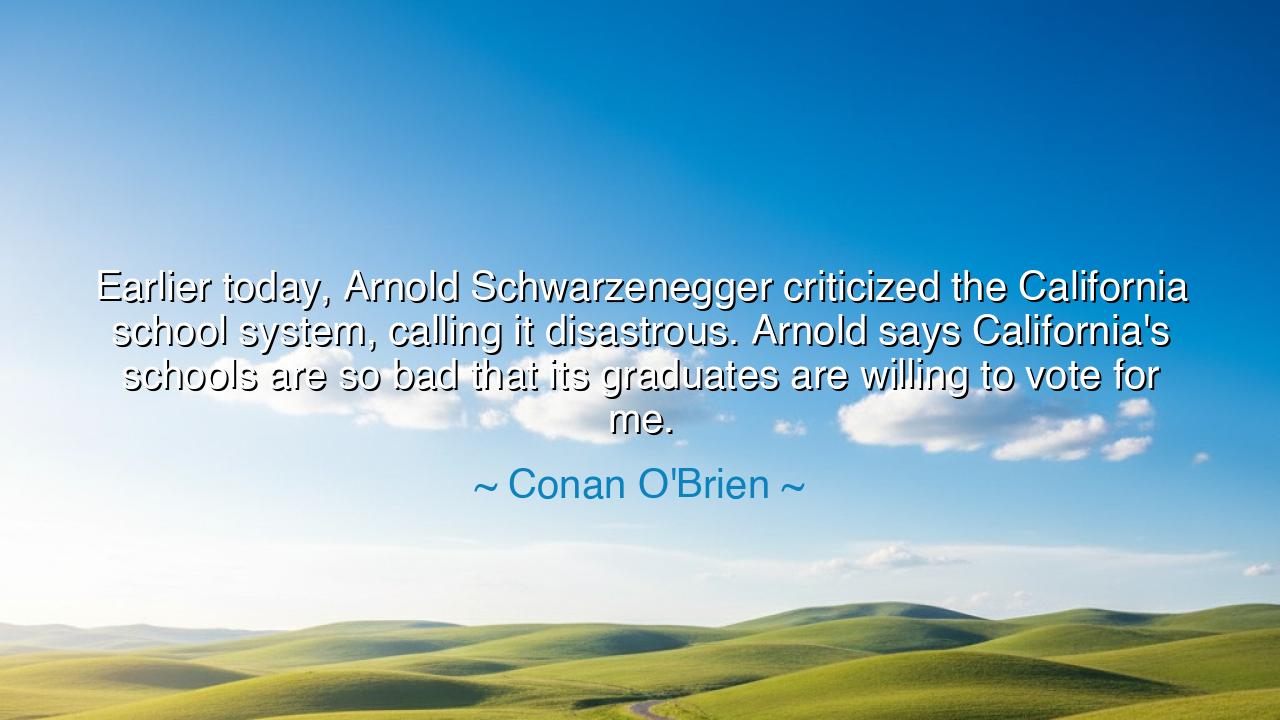
Earlier today, Arnold Schwarzenegger criticized the California
Earlier today, Arnold Schwarzenegger criticized the California school system, calling it disastrous. Arnold says California's schools are so bad that its graduates are willing to vote for me.






The words “Earlier today, Arnold Schwarzenegger criticized the California school system, calling it disastrous. Arnold says California's schools are so bad that its graduates are willing to vote for me” spoken by Conan O’Brien may first appear as jest, yet beneath the humor lies a layered observation on education, leadership, and the consequences of societal neglect. Through his characteristic wit, O’Brien highlights the gravity of systemic failure in schooling — a failure so pronounced that it shapes not only minds but civic choices. The joke, while playful, carries a serious undertone: a society that falters in educating its youth endangers the very foundations of judgment, responsibility, and democracy.
In the style of the ancients, we might liken O’Brien’s remark to the satirical speeches of Lucian of Samosata, who wielded humor to expose the flaws and follies of society. The laughter masks insight: it is a warning to rulers, teachers, and citizens alike that education is not merely a preparation for work, but a cultivation of wisdom and discernment. When schools fail in their duty, the consequences ripple outward, shaping not just careers, but the moral and civic fabric of the community. O’Brien’s jest is a modern oracle, reminding us that negligence in one realm can echo in others in ways unforeseen.
The origin of this quote lies in O’Brien’s role as a cultural commentator, a voice that blends comedy with reflection. By juxtaposing Arnold Schwarzenegger’s critique with his own persona, O’Brien exposes the irony of public perception: a system so flawed that even its graduates’ decisions become a punchline. Yet buried beneath the humor is a sober truth: schooling shapes the mind’s capacity for judgment, reasoning, and critical thinking. When education falters, the consequences manifest not only in personal achievement but in collective decision-making, reflecting a chain reaction from classroom to ballot box.
History provides cautionary examples that resonate with O’Brien’s satire. In ancient Athens, the philosopher Socrates lamented that many citizens were unfit to participate in governance, for they had not been properly educated in virtue, rhetoric, or ethics. He feared that without cultivation of wisdom and discernment, democracy could be undone by ignorance. Similarly, O’Brien’s joke underscores a modern reflection of that ancient fear: the collapse of educational standards diminishes the capacity of citizens to act wisely, rendering humor and politics inseparable in their consequences.
Yet there is a subtle heroism in O’Brien’s words. By framing the critique as comedy, he transforms despair into reflection, inviting the listener to laugh, yet to learn. Comedy, like the parables of old, becomes a vessel for moral truth. Through exaggeration and wit, he compels us to see the stakes clearly: that education is not an abstraction, but the lifeblood of society, shaping choices, values, and futures. Laughter is the bridge by which the uncomfortable truth reaches the heart, preparing it for action.
Consider the story of Horace Mann, the father of public education in the United States, who devoted his life to reforming schools in the 19th century. Mann understood that the strength of a republic depended upon the enlightenment of its citizens. Without proper schooling, the populace cannot govern wisely, make informed decisions, or pursue justice. O’Brien’s quip echoes this wisdom across centuries: laughter may deliver it, but the lesson remains the same — invest in education, or suffer the consequences.
Dear listener, the lesson is both cautionary and motivational. Do not underestimate the power of schooling to shape minds, character, and civic virtue. Pay attention not only to content, but to method, encouragement, and the fostering of discernment. Leaders, teachers, and families share the sacred duty of cultivating intellect and judgment. Humor reminds us, but responsibility demands action.
In the end, O’Brien’s words carry the weight of truth beneath the levity: education shapes destiny. Ignore it at your peril, invest in it with all diligence, and guide it with wisdom. For when the classrooms fail, society falters — and even the most humorous of observations becomes a prophecy. The voice of jest, like that of the ancients, can awaken us to the urgent need to nurture knowledge, character, and discernment in every generation.






AAdministratorAdministrator
Welcome, honored guests. Please leave a comment, we will respond soon